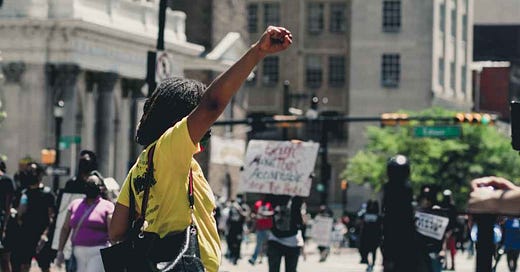“The true focus of revolutionary change is never merely the oppressive situations which we seek to escape, but that piece of the oppressor which is planted deep within each of us, and which knows only the oppressors' tactics, the oppressors' relationships.” Audre Lorde, Sister Outsider, p. 116
I worked with a doctoral student who was a Continental African. I provided a space for that student and worked to create a safety net because I wanted to provide her with skills and wisdom to navigate the pitfalls of unchecked White privilege within religious scholarship.

Though I provided support for several students, this particular student came to the UK with an unchecked privilege of her own - the privilege of a world where she knew the Black majority population of her home as a safe haven of existence. When she looked at judges, police, teachers, neighbors - each intercommunal relationship, each relationship of authority - they were people who looked like her.
The student lacked, perhaps, a clear capacity to critique systems of oppression such as patriarchy and heterosexism. She did not understand that there multiple social constructs of race, gender and sexuality, into which we are socialized with performative standards for these categories.
As Brittney Cooper brilliantly indicated this, people are born with specific genitals, but not with the blue print that dictates their personalities - these are socialized. Boys who like pink or who enjoy dance, girls, who enjoy playing with trucks or wearing jeans - these tendancies are constantly shaped and moulded into an acceptable gender. The capacity to critique, interrogate and analyze these systems is a significant part of what makes us "scholars." Without the capacity to do this, no matter your title or income, you fail to demonstrate even adequate scholarship.
But when someone who has never before lived in a racially hostile world and lashes out at the people of color who examine these systems, they demonstrate an inability to learn from those who have spent their lives in that system. They also lack the capacity to evaluate interlocking systems of oppression. That is not on par with what I expect from a doctoral candidate.

Finally, students who lack this capacity demonstrate that the oppressor's seed has taken root within them. Perhaps they are being scholarshiped through White religious groups or companies, so they fear retaliation if they provide a thorough critique. But without the freedom and courage to engage with these critiques, we could end up with a world that looks like the one our grandparents were fighting to change. This was a world of what was called "Jim Crow" laws in the US, "Race Relations" in the UK, segregation laws (regarding the Aboriginals) in Australia. Each of these countries had segregation laws. According to The Guardian,
"Between the 1910s and 1970, 7,000 children aged between three and 14 were transported to Australia as part of Britain’s child migrant program. Promised a better life and loving families waiting to adopt, most were instead delivered into institutions where large numbers suffered abuse. Often their names or birth dates were changed, erasing their links to their families of origin. Very few were adopted or fostered," (The Guardian, 12 March 2023, "I Couldn't Love Her").
The segregation laws in the US are well known regarding separate water fountains, denied access to voter polls, and separate/unequal schools are all part of that inherited racialized past. In fact, we stand right at the precipice of a return to that now. In the same way that we must critique the changes in laws that could threaten our right to full citizenship, we must also interrogate the way knowledge production is identified, justified and validated. As Sociologist Patricia Hill Collins states,
"... elite White men and their representatives control structures of knowledge validation, White male interests pervade the thematic context of traditional scholarship." (Hill Collins, Black Feminist thought, p. 251)
Vulnerable groups become even more vulnerable whenever they fail to interrogate the way knowledge production functions and spreads. When the oppressor's seed is planted deeply within us, we often function as gatekeepers against others within our own communities.
The problem is, the very person
you are blocking
will eventually be
... you.
Dr. CL Nash for the Misogynoir to Mishpat (M2M) Research Network © 2025




